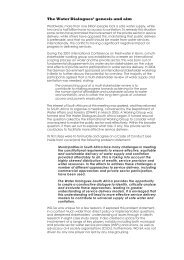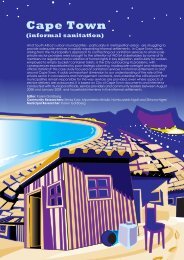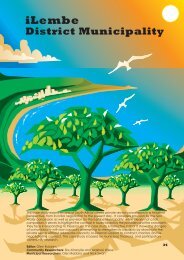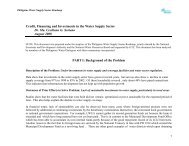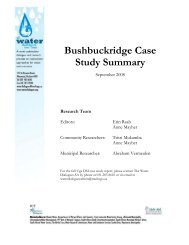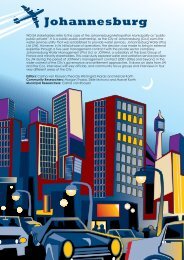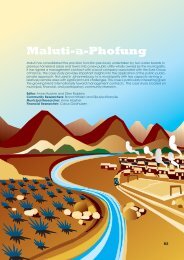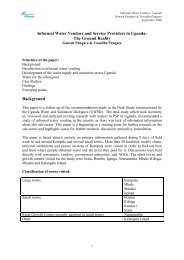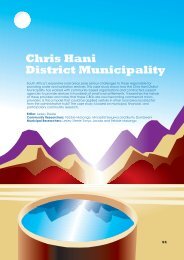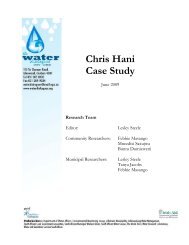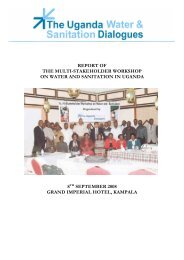Ugu Case Study Summary - The Water Dialogues
Ugu Case Study Summary - The Water Dialogues
Ugu Case Study Summary - The Water Dialogues
Create successful ePaper yourself
Turn your PDF publications into a flip-book with our unique Google optimized e-Paper software.
Furthermore, community members pay for the building blocks, dig their own holes and,<br />
although the municipality provided the container, households have to collect the container<br />
from the councillor which requires a vehicle. This further increases the overall cost of<br />
installing toilets.<br />
Rural users with access to standpipes are not prevented from accessing an unlimited amount<br />
of water in theory, but the access is at a lower level of service (e.g. standpipes). It is also unlikely<br />
a household would be able to access more than six kilolitres per month as it would be almost<br />
impossible to carry that amount of water over that time period, and access is also restricted<br />
by frequent disruptions in the service due to pipes breaking or low water pressure.<br />
Finding 6: <strong>Ugu</strong> DM has a FBW policy, but there is some confusion about<br />
how many people it covers, how it is reflected in billing and whether it<br />
is well-publicised.<br />
<strong>Ugu</strong> DM maintains it allows every household six kilolitres of water per month under the FBW<br />
policy. However, the statistics on users receiving FBW, as with the backlog and other data, are<br />
inconsistent across different organisations’ studies and reports.<br />
<strong>Ugu</strong> DM reports 61 percent of the population is receiving FBW (everyone with access), but the<br />
2006/07 Provincial <strong>Water</strong> Sector Plan reports that <strong>Ugu</strong> is only reaching 41.6 percent of the total<br />
population with FBW and only 46.6 percent of the poor population. According to the Provincial<br />
<strong>Water</strong> Sector Plan, this is one of the lowest percentages of all of the district municipalities in the<br />
province.<br />
Part of the confusion may be about what is considered provision of “free” basic water.<br />
While water from communal standpipes is free, any household with a connection pays a<br />
basic charge;<br />
Tariff policies accessed via the DM’s webpage do not clearly reflect how the policies apply<br />
(especially the indigent policy).<br />
Typically, the charges per kilolitre should only commence after the FBW allocation of six kilolitres<br />
has been used. <strong>Ugu</strong> implements a FBW policy and has an official indigent register for metered<br />
users, but none of the communities had much knowledge about either.<br />
In KwaQwabe and Umkhunya no one was paying for water as the highest level of service<br />
available was standpipes, thus participants did not know about the policy, and were<br />
understandably not very concerned about it. In Umthimude and Amahlongwa, where some<br />
households were receiving bills, participants still indicated they had very little knowledge about<br />
FBW. <strong>The</strong>re was, however, some indication from the communities that the FBW policy was being<br />
applied. In one area, elderly people were charged reduced connection fees by the municipality.<br />
One of the participants, who is disabled, said he does not pay for water and he took this upon<br />
himself to let the municipality know about his disability. He said he had been telling other people<br />
in the community to do the same.<br />
<strong>The</strong> question remains as to whether the indigent register is well-publicised, whether it shows<br />
clearly on statements or whether the application process is user-friendly, but the policy is in<br />
place to protect the poor. If a user can show the household has an income of less than R2,000<br />
per month, the household is qualified for reductions in some fees:<br />
<strong>The</strong> basic charge for water is waived for usage of up to six kilolitres per month. <strong>Water</strong> usage<br />
above six kilolitres is charged at the standard tariff applicable to other users. If a household<br />
fails to pay for over-usage, a restrictive device is installed to limit water consumption to<br />
the six kilolitres per month until the outstanding amounts are paid;<br />
<strong>The</strong> municipality is piloting a programme for indigent households that waives the monthly<br />
sanitation charge (for those on the indigent register who have water-borne sewage), and<br />
provides households using conservancy tanks with one free draw per month.<br />
Finding 7: Like most South African municipalities, <strong>Ugu</strong> is facing a critical<br />
shortage of staff.<br />
<strong>Ugu</strong> DM has a large staff dedicated to water and sanitation services, and has a relatively good<br />
retention rate. However, it faces severe shortages in key skilled areas and many positions,<br />
THE WATER DIALOGUES SYNTHESIS REPORT 2009-<strong>Ugu</strong> <strong>Case</strong> <strong>Study</strong><br />
124



